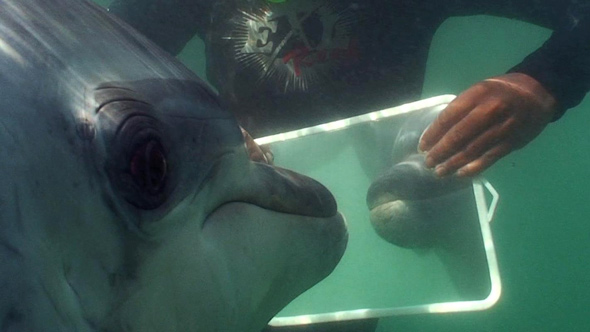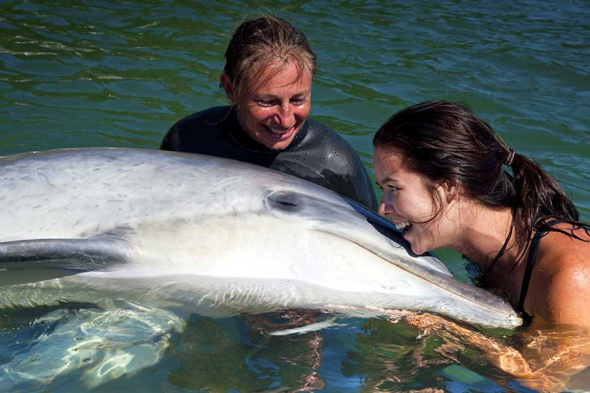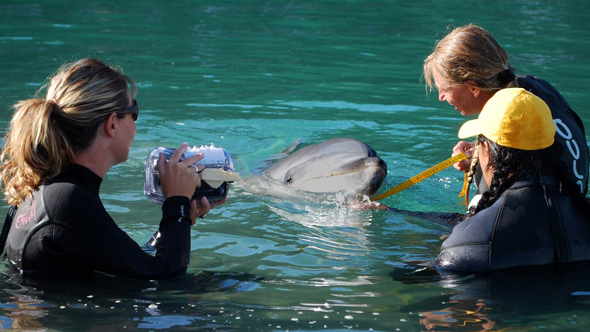Interview: ‘Soul in the Sea’ director Amy Taylor

Soul in the Sea is a New Zealand documentary on Moko, the astonishingly sociable dolphin who became an icon in the town of Whakatane, earning his share of friends and detractors. Filmmaker Amy Taylor spent six months following the friendly mammal and his impact on the town.
Soul in the Sea is screening at this year’s New Zealand International Film Festival. We asked Taylor a few questions about the film.
Moko the dolphin is a treasured Whakatane icon well-known in New Zealand. Did you have to fight off any other filmmakers in order to make a documentary on him?
TAYLOR: Moko was originally from Mahia where he spent most of his life, but I only heard about him not long before he turned up in Whakatane. I didn’t come across anyone else making a documentary about him which I was quite amazed about – I guess I was just lucky that at that time I was free to spend a few months based in Whakatane filming, and it helped to have a background in wildlife filmmaking and marine biology.
When you first started filming Moko, what were you originally trying to achieve?
Around the time I started filming I watched The Cove – an Oscar-winning documentary about dolphins in Japan being rounded up and slaughtered or bought by dolphin trainers. I was completely shocked by it. The doco also shows that in the last couple of decades there’s been a lot of research into dolphin intelligence and the results caused many people to re-think the way they were being treated in captivity and in the wild.
There’s now a lot of support in the scientific community for dolphins to have “non-human person status” – they share many of the same brain structures and functions as humans, and dolphins like Moko have given many people the chance to see this intelligence first hand. I thought that a documentary about him would put a face and personality to the countless dolphins that are killed or kept in captivity each year, and inspire people to help protect them and most importantly to stop going to dolphin shows like the ones at Seaworld.

I also wanted to record a unique piece of NZ history – it’s not often a friendly dolphin like Moko comes along! And although some people thought there was no story I liked the idea of spending the summer following him around with a camera, and I felt like something would unfold.
What was the biggest difficulty you faced when the story approached its end?
I was pretty attached to Moko after a few months filming, so when we went to Matakana to identify his body it was very emotional. I struggled to keep filming. I’d never experienced death before – and even though he was “just a dolphin” to some people he felt like a lot more to those who knew him and spent time with him.
The other difficulty was editing the many hours of footage I had shot – since I was doing almost everything myself (shooting, directing, editing etc.) sometimes it was hard to figure out what to include in the film but as the editing progressed it became a lot clearer.
It was a beautiful night with a full moon so I got in the water and he started jumping over me!
Could you share your strongest memory from filming?
There were quite a few really memorable moments…
One evening when the sun was going down and I was the last person in the water Moko fell asleep next to me and we just floated for a while, heads touching, until I got too cold and started trying to slowly move towards the shore but he kept opening one eye briefly and moving in front of me to block me. It was really subtle but made me realize he just really wanted company – I stayed in until I was freezing!
He didn’t always try to keep people in the water though – I think he got a bit concerned about me once because I was floating on my back not moving, I heard him echolocating underneath me (using sonar to see if I was OK) then when I still didn’t move he pushed me about 20 metres into the shore.
Another time I stayed on a yacht overnight and Moko turned up around midnight with a boogie board wanting to play. It was a beautiful night with a full moon so I got in the water and he started jumping over me! When I finally got out we still didn’t get much sleep because he spent most of the time banging into the rudder and whistling trying to wake us up.

If you could make a documentary on anyone, or any animal, alive or dead, who would it be?
The Dalai Lama is someone I’ve always admired – he has a great mix of wisdom, compassion, humour, and an incredible life story.
What was the last great film you saw?
Drama – The Intouchables
Documentary – Searching for Sugarman
I’m looking forward to seeing Blackfish though, so I think that will soon top the list!
What are you thinking about doing next?
Having a baby in November! Also developing a medical documentary, and a story based on people swimming with humpback whales in Tonga.

















